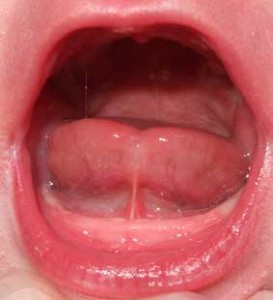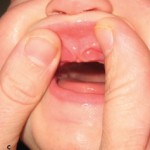Breastfeeding Problems And The Tongue Tied Baby
When your child is having trouble breastfeeding , there could be many reasons. One is ankyylglossia, or tongue-tie. This occurs when the connective tissue under the tongue is too tight. This prevents the baby from extending his or her tongue to nurse.
 For babies who are breastfeeding , their tiny tongues have to be able to perform a more complex type of sucking than what it takes to drink from a bottle. A tongue tie can hinder baby’s efforts to move his tongue up, down and out. Which is what he would need to do in order to nurse.
For babies who are breastfeeding , their tiny tongues have to be able to perform a more complex type of sucking than what it takes to drink from a bottle. A tongue tie can hinder baby’s efforts to move his tongue up, down and out. Which is what he would need to do in order to nurse.
Pain while breastfeeding
Difficulty in latching on to the breast can also cause the mother to experience nipple pain and/or trauma. This leads many new mothers to give up breastfeeding. Ankyylglossia can also lead to other breastfeeding problems, such as slow weight gain, a poor maternal milk supply, poor bonding between baby and mother, sleep deprivation, nipple damage, bleeding, blanching or distortion of the nipples, and depression or a sense of failure.
The condition is more common in boys than in girls. It appears to be genetic in origin. Studies show about 2 percent to 5 percent of babies have constrictive tissue under the tongue. About half of those babies have problems with breastfeeding, according to Isabella Knox, an associate professor of pediatrics at the University of Washington.
Some babies learn to compensate by periodically releasing the mouth from the breast, because the tongue may be a little sore from keeping it extended during nursing. This itself can result in a poor seal, causing the baby to gulp in air while nursing, resulting in gassiness.
Advantages of breastfeeding
According to the American Academy of Pediatrics, breast milk is considered the optimal food for babies. Studies have shown that exclusive breastfeeding offers infants some protection against diseases and common childhood illnesses, such as ear infections. So an inability to breastfeed can cause all kinds of problems, depending largely on the age of the subject and the severity of the condition.
To tell if your baby is tongue-tied, look at him or her and stick out your tongue. Even tiny babies will imitate you. If the baby is unable to extend the tongue fully, or if it has a heart shaped appearance on the tip, then you should have him evaluated by his doctor. You can also try putting your finger in his mouth – pad side up – until he starts sucking. See if his tongue extends over his gum line to cup the bottom of your finger. If not, you may want to have him checked.
Some of those problems are manifest in adults, who have to contend with problems that are the result of old habits of compensating for inadequate tongue mobility. These troubles include social and domestic situations, self-esteem, the work environment, and dental health. Thus it appears that the consequences of an unrepaired tongue tie problem are not reduced over time, but only increase. Some of these specifics include an inability to inability to speak clearly when talking fast/loud/soft; difficulty talking after even moderate amounts of alcohol; migraines; protrusion of the lower jaws; an effect on social situations, including eating out, kissing, and relationships; and emotional factors resulting in rising levels of stress.
Frenectomy or tongue clipping
Luckily, there is a way to treat it and Jerusalem dentist, Dr. Ari Greenspan has a lot of experience doing it. While many health care providers only diagnose the most severe tongue-ties, resulting in this condition often going under diagnosed, in reality a simple snip can fix the problem – though many doctors still do not perform the procedure, despite the negative effects cited above that a tongue tie can have on breastfeeding.
The snip is called a frenectomy, and it is far simpler than a circumcision, which is done routinely. Indeed, it is said that it takes longer to fill out the consent form for the procedure, than to do the actual procedure itself. In the snip process, the baby is swaddled, and its head is immobilized by a nurse. The surgeon uses a depressor to force the tongue to the roof of the mouth, and the tongue tie is divided, or snipped using sterile surgical scissors.
In studies done on the procedure, babies were immediately returned to their mothers for breast-feeding. During interviews, 21 (78 percent) of 27 women whose infants received corrective surgery said breast-feeding had improved. One reason attributed to the success was the healing of the breast and nipple injuries that had occurred before the tongue-tie division was performed.
While most infants start out breastfeeding, it may be difficult to find a doctor who recognizes the problem that tongue-tie can present for a nursing baby, and is willing to perform a frenectomy. The procedure is seldom mentioned in the pediatric literature, and is no longer routinely taught in medical school. But the procedure can be a God-send to those mothers whose babies suffer from the problem.

